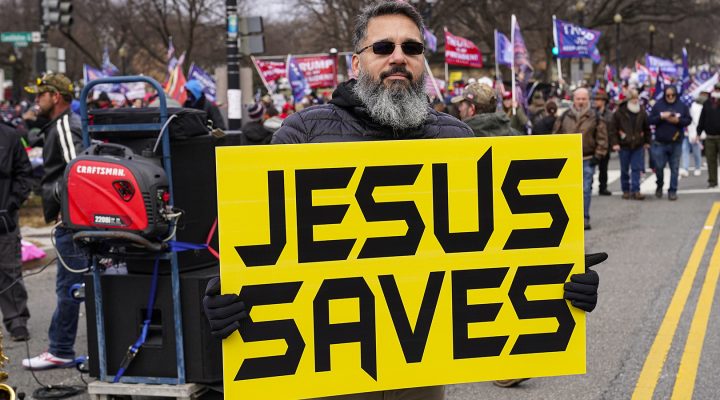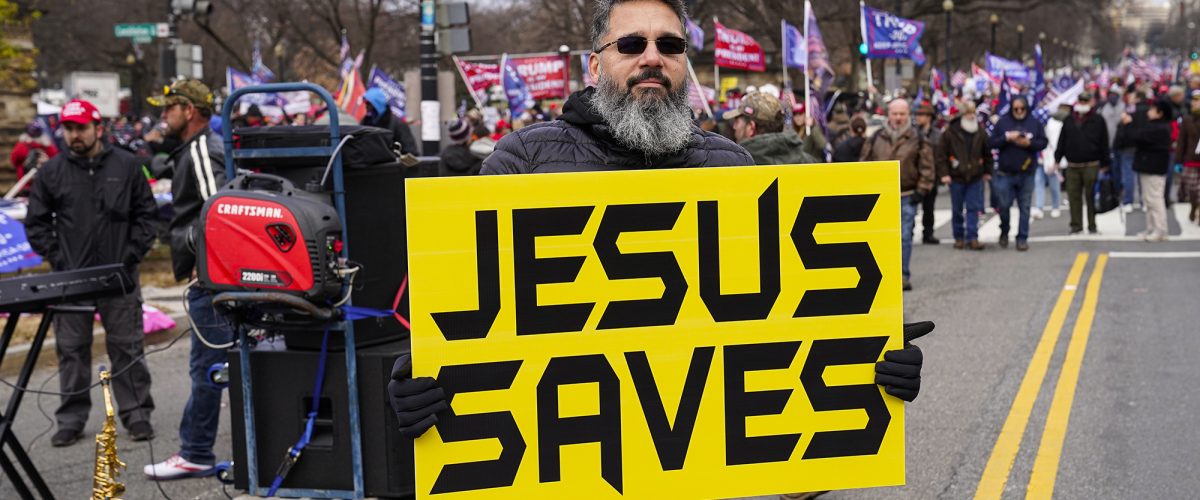Last Friday marked the two-year anniversary since the attempted insurrection at the U.S. Capitol on January 6, 2021. On that day, I was living about a half mile away from the Capitol, and I remember sitting in my home, glued to my television as I heard sirens and helicopters circling overhead. Even after four years with Donald Trump as president, I rather naively never expected there might be an actual attempt to overturn our democracy. Yet here we were.
What was most shameful about that day for me were the throngs of so-called Christians, holding large wooden crosses and signs with Bible verses who had come to D.C. that day believing they were enacting the will of God by resisting the attempt of a corrupt political establishment to prevent Donald Trump (whom many believed was the God anointed leader) from continuing his “righteous reign.” They had been convinced by pastors, politicians and pundits alike that they were engaged in a holy war of biblical proportions and were commanded by God to fight for Trump.

Brandan Robertson
At the foundation of these beliefs was an ideology that had existed for far longer than the Trump presidency and indeed has been the justification for many a holy war over the past 2,000 years — Christian nationalism. Christian nationalism, at its core, believes a particular nation is to be guided by Christian religious values and that the government, to be right before God, must privilege Christianity as the moral truth and legislate Christian ideology for the good of everyone. American Christian nationalism saw a gradual rebirth during the 1960s in the development of the Religious Right and has continued to grow in influence in conservative churches and political circles since.
Yet never before in the history of the United States had a U.S. president sanctified Christian nationalism with his blessing and approval like Donald Trump.
Truth be told, Trump likely doesn’t know the first thing about Christian values, conservative or otherwise, and instead saw Christian nationalism as a powerful tool to rally his base against the common enemy of the left, whom Christian nationalists speak of in extreme terms such as “antichrist” and “satanic.” If Trump was a master at anything, it was identifying ways to use fear to divide and empower his base to act on his behalf. Christian nationalism proved to be an effective ideological tool for his agenda — so effective that it motivated thousands of his devoted followers to head to the Capitol to attempt to stop the certification of President Joe Biden’s election.
Since January 6, Christian nationalism has continued to grow in popularity, with many pastors, public theologians and politicians declaring themselves to be unashamed Christian nationalists and encouraging their followers to do the same. In 2022, two books were published that shot to the top of the Amazon bestsellers list that lay out comprehensive “biblical” cases for hardcore Christian nationalism: The Case for Christian Nationalism by Stephen Wolfe and Christian Nationalism: A Biblical Guide for Taking Dominion and Discipling Nations by Andrew Torba and Andrew Isker.
These books do not offer calls for Christians to “vote their values” as we’ve heard from Christian conservatives in the past but go so far as to suggest Christians are called to use violence to establish a Christian nation and establish a government that criminally prosecutes those they deem to be “heretics.”
Pastor Doug Wilson — who is famous for defending slavery in the American South — makes weekly videos for his nearly 100,000 followers on YouTube, where he jovially articulates a case for Christian nationalism and mocks people of faith who oppose his perspective.
And if you had any doubt these views were making their way into the mainstream, Pew Research released a poll in 2022 that showed 45% of Americans believe our country should be a “Christian nation.”
It is easy for many to shrug off Christian nationalism as a fringe movement that can simply be ignored, but the truth is many millions of conservatives are being lured into adopting this ideology and could very well be driven to take action to undermine our pluralistic democracy to make it a reality — even by force.
“We must recognize the real and present danger the ideology of Christian nationalism poses to the safety and security of our democracy.”
This is no time to be naïve. We must recognize the real and present danger the ideology of Christian nationalism poses to the safety and security of our democracy and work hard not only to expose and oppose it, but to articulate a compelling alternative vision.
The vast majority of Christian theology supports not nationalism, but a pluralistic view of the world, where followers of Christ are compelled to proactively work for the common good of their neighbor, to love their enemies, to make a separation between the “kingdom of this world” and the “kingdom of God.” More than this, we must refuse to fall into the trap of intense polarization where we demonize those with different (but still reasonable) political beliefs but seek to find common ground wherever possible, ensuring the pluralistic project of America continues onward.
This is a moment for all Americans to recognize the unprecedented threat Christian nationalism poses to our democracy, not forgetting that Christian nationalists already have shown us they are willing and able to upend our democracy. This is not a matter of differing political perspectives, but a fundamental difference in whether American democracy is worth maintaining at all.
Our democracy has not faced a similar attempt to undermine it in hundreds of years, and we should not underestimate the potency of radical, religiously rooted political ideology to motivate the masses to overturn it.
Brandan Robertson is a New York City-based author, activist and public theologian working at the intersections of spirituality, sexuality and social renewal. He serves as lead pastor of Metanoia Church, a digital progressive faith community, and is host of The Unorthodox Podcast. He is the author of seven books on spirituality, justice and theology. Named by the Human Rights Campaign as one of the top faith leaders leading the fight for LGBTQ equality, Robertson has worked with political leaders and activists around the world to end conversion therapy and promote the human rights of sexual and gender minorities. He earned a bachelor of arts degree in pastoral ministry and theology from Moody Bible Institute, a master of theological studies degree from Iliff School of Theology and a master of arts in political science and public administration from Eastern Illinois University. He is currently pursuing a Ph.D. in religion at Drew University.
Related articles:
The New Apostolic Reformation drove the January 6 riots, so why was it overlooked by the House Select Committee? | Analysis by Rick Pidcock
BJC offers free downloadable report explaining January 6 in light of Christian nationalism
Five takeaways from the Report on Christian Nationalism and January 6 | Opinion by Corey Fields


